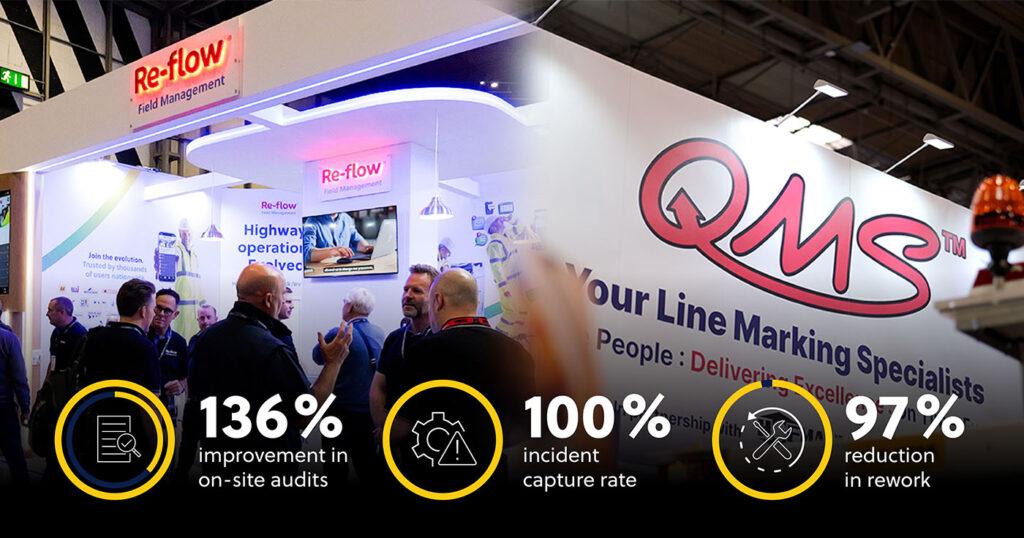
Highways UK took place on 15-16 October in the NEC. The show saw Re-flow recognised for impactful work in the industry and gave perspective to long-term industry initiatives in a way that might be a surprise to some.
Re-flow are Highways UK Digital Innovation winners
Making measurable improvements to the construction industry as a whole has always been a core focus for the Re-flow team.
Their drive is to improve safety and to streamline workflows in a way that aligns to the ever-evolving needs of the sector. This gives businesses scalable, reliable compliance tools in order to guarantee their professionalism – and provides branded reports, CVIs, and invoices to improve client satisfaction and to make invoicing straightforward.
And they’ve now won the Digital Innovation award at Highways UK.

Background on the win
After collaborating with Quality Marking Services (QMS) by providing Re-flow as a field management foundation for their ambitious and often innovative work (QMS launched their latest line-marking innovation at the show), the business reported:
- A 136% improvement in on-site audits
- A 100% incident capture rate
- A 97% reduction in rework
- 30 hours saved per week through software automations and streamlining features
- A 50% reduction in job-cycle times
QMS are now capturing their compliance data and safety insights from their sites, and visibility of their teams helps them plan their next works in real time. They’re set up with a modern management system that’s future proofed the business.

Highways UK show trends: a timely return to addressing carbon
While politics has a huge impact on long-term infrastructure planning, sometimes innovation and excellence rise above the noise.
Regardless of the environment dropping out of the news cycle, a common theme at Highways UK saw multiple Net Zero-inspired initiatives ‘bear fruit’. That’s to say that initiatives that began in the aftermath of the UK government signing Net Zero into law, can now be seen in pioneering projects in the sector.
From multiple talks discussing the Lower Thames Crossing – ‘the greenest road ever built‘ – to National Highways’ commitments to forward-thinking planning on projects, the trend is clear.
Carbon management, incentives for low-carbon construction, and the phasing out of diesel are initiatives happening on the biggest projects in the country – an approach mirrored by Heathrow, Transport for London, the Environment Agency, and many more.
Very often the benefits of these more forward-thinking projects are felt far and wide. Often, they’re also an essential reaction to changing weather conditions.
‘Resilience’ was another word that cropped up multiple times during the show. The fact is that the UK’s ever-growing renewal backlog of aging infrastructure is also faced with the destructive impact of wetter and hotter weather. Planning and design can help mitigate the impact much better than cynicism.
We are finding ways to do better.
For example, as discussed at the show, National Highways are addressing an area around the A628 and A62 in Manchester, where there have been 81 flooding incidents. In collaboration with Moors for the Future they’re redeveloping peatland, which functions as a natural sponge and releases moisture slowly. A secondary benefit is the protection against wildfires.
Other success stories included the A417 scheme ‘with its design and engineering carefully tailored to fit seamlessly into the surrounding environment’, and which is – partly as a result – the first National Highways project to gain a development consent order without any challenges.
It’s a considerably progressive road design that focuses on providing benefits to the countryside – improving footpaths, enhancing landscape, and helping limit biodiversity loss.
Discover more about award-winning Re-flow Field Management – helping make highways companies safer, more productive, and more sustainable.





